 Petzlover
Petzlover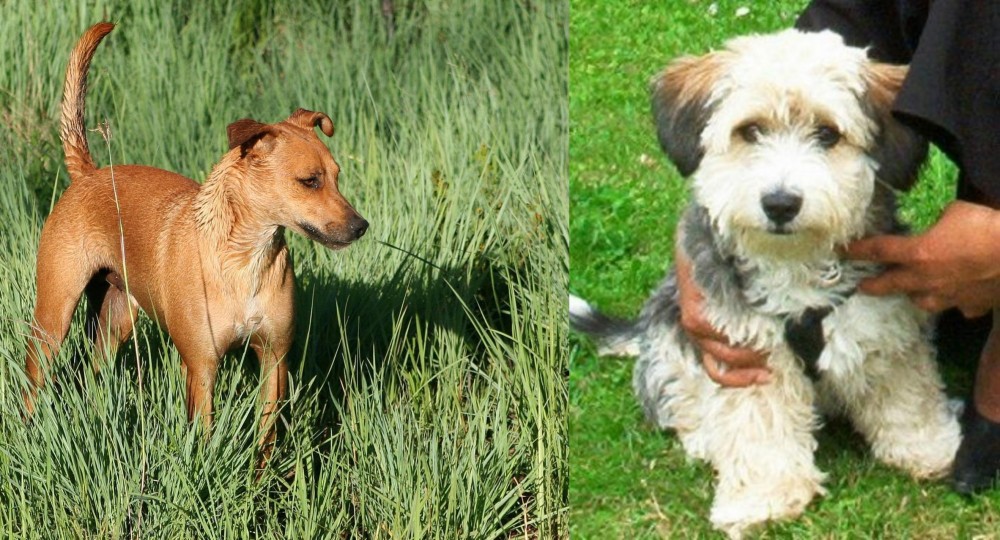 Africanis is originated from South Africa but Yo-Chon is originated from United States. Africanis may grow 30 cm / 12 inches higher than Yo-Chon. Africanis may weigh 41 kg / 91 pounds more than Yo-Chon. Both Africanis and Yo-Chon has almost same life span. Both Africanis and Yo-Chon has almost same litter size. Africanis requires Low Maintenance. But Yo-Chon requires Moderate Maintenance
Africanis is originated from South Africa but Yo-Chon is originated from United States. Africanis may grow 30 cm / 12 inches higher than Yo-Chon. Africanis may weigh 41 kg / 91 pounds more than Yo-Chon. Both Africanis and Yo-Chon has almost same life span. Both Africanis and Yo-Chon has almost same litter size. Africanis requires Low Maintenance. But Yo-Chon requires Moderate Maintenance
 Africanis is one of the original African breeds. This breed was not shaped by humans, but they went through the process of natural selection. Humans did not affect this breed by standard breeding practices. Through the history, this breed became stronger and stronger because only the strongest of the breed survived. Africanis descent is the early dog that is originally from ancient Egypt. Approximately 4500 BC was the period of first data about this breed.
Africanis is one of the original African breeds. This breed was not shaped by humans, but they went through the process of natural selection. Humans did not affect this breed by standard breeding practices. Through the history, this breed became stronger and stronger because only the strongest of the breed survived. Africanis descent is the early dog that is originally from ancient Egypt. Approximately 4500 BC was the period of first data about this breed.
As time passes through, Africanis became more and more popular through the whole continent. This breed migrated with people for thousands of years, and now, a modern Africanis is similar to Greyhound dog. The original Africanis can be found in tribes and more traditional people. One of the oldest breeds in the world is one of the lasts that has been recognized by Kennel Union of Southern Africa.
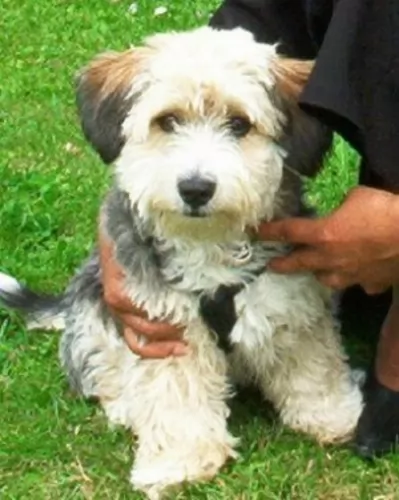 The Yorkie Bichon or Yo-Chon as he is fondly referred to as a designer crossbreed hailing from the United States.
The Yorkie Bichon or Yo-Chon as he is fondly referred to as a designer crossbreed hailing from the United States.
Information isn’t readily available on the origins of this cute little dog, but the dog is believed to be a cross between a Bichon Frise and Yorkshire Terrier.
It is thought that the dog was developed in the United States from about 1998 to 2001. As a hybrid, the Yorkie Bichon isn’t recognized by the American Kennel Club.
 Africanis origins from South Africa. The average Africanis weights 25-45 kg, with a height of 50-60cm, while females are slightly smaller. They are medium sized dogs who are friendly, but also independent and territorial. They can are good pets for training, but it requires persistent work.
Africanis origins from South Africa. The average Africanis weights 25-45 kg, with a height of 50-60cm, while females are slightly smaller. They are medium sized dogs who are friendly, but also independent and territorial. They can are good pets for training, but it requires persistent work.
The lifespan of Africans is 10-12 years, but lifespan always depends on health, genetics, and care of the dog. Therefore, if they are healthy and well cared they can live longer than average.
Litter Size variates a lot, so female can have 2-8 puppies.
 The Yo-Chon stands between 25 and 30cm and weighs in the region of 2 to 4kg. He can be like a teddy-bear this little dog and the coat can be either silky and straight or wavy. It is medium length and some people have the coat professionally trimmed.
The Yo-Chon stands between 25 and 30cm and weighs in the region of 2 to 4kg. He can be like a teddy-bear this little dog and the coat can be either silky and straight or wavy. It is medium length and some people have the coat professionally trimmed.
The low shedding coat comes in a variety of colors – cream, grey, tan, white, black or bi-colored.
Your Yorkie Bichon will no doubt have some habits that come from both parent breeds. Your dog is likely to be independent, social, friendly, social and loving, wanting to spend lots of time with you.
They’re small but they make good watchdogs with their high-pitch bark. Your Yo-Chon is an intelligent little dog too and by having him trained and socialized he is well behaved and pleasant to have around. You can tell him to lie down, sit or stay which is useful when you have visitors.
He gets on well with children, but the puppies particularly are tiny and fragile and they can easily get hurt by untrained and undisciplined children.
 Africanis is a very good and healthy breed. They are very intelligent and friendly breed. They are not an aggressive breed, but they tend to protect the master. Africanis is a natural guard dog. This breed is used to being alone because for the centuries they migrated close to humans, but they also have been independent.
Africanis is a very good and healthy breed. They are very intelligent and friendly breed. They are not an aggressive breed, but they tend to protect the master. Africanis is a natural guard dog. This breed is used to being alone because for the centuries they migrated close to humans, but they also have been independent.
Training Africanis is not very hard. They tend to learn very quickly. Positive training with awards is the best way to train your Africanis. The old-fashioned way of training dogs with punishment is not recommendable for Africanis. They are intelligent breed who requires patience and constancy.
They are very good with other animals too, but they need proper socialization. Africanis requires daily exercise so if you keep your dog in the apartment it should have few daily walks. Africanis can live in the apartments though.
Overall, they are very healthy breed, so with regular vet checks and proper care, they are perfect pets for the whole family since they are great and gentle with small children and kids.
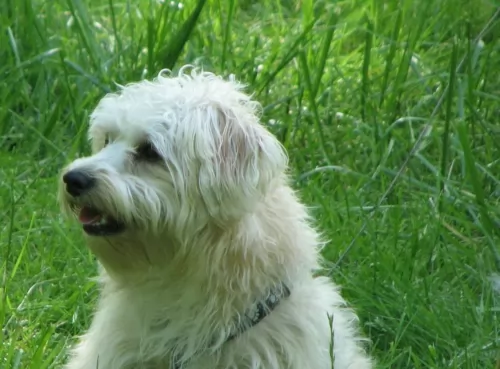 The Yo-Chon is an independent, happy dog who loves nothing more than to be surrounded by all his favorite human beings.
The Yo-Chon is an independent, happy dog who loves nothing more than to be surrounded by all his favorite human beings.
They are loving, loyal and gentle dogs and are good playmates for children who have been taught how to handle them with care and kindness.
He is smart and has an amicable nature and will take kindly to being trained and socialized.
With the Yo-Chon in your life, you can be sure you’re going to benefit from having a splendid family pet and companion.
 The great thing about Africanis is that this breed is very healthy. Thousands of years of evolution made this breed one of the toughest breeds in the world. They can survive very tough conditions. Africanis has a very healthy immune system too. It evolves so strong that there are no internal or external parasites that can harm the dog.
The great thing about Africanis is that this breed is very healthy. Thousands of years of evolution made this breed one of the toughest breeds in the world. They can survive very tough conditions. Africanis has a very healthy immune system too. It evolves so strong that there are no internal or external parasites that can harm the dog.
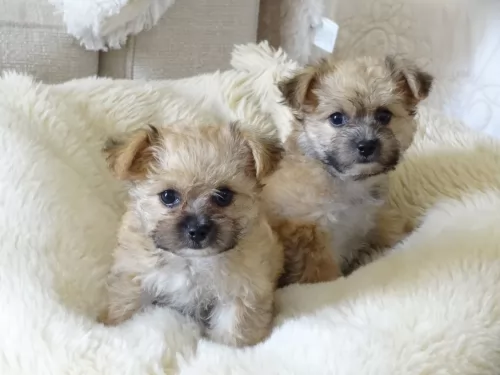 Both the Yorkie and Bichon Frise are dog breeds that are prone to Legg-Calvé-Perthes disease. This is when there is insufficient blood supply to the hind thigh bone, so the dog becomes lame.
Both the Yorkie and Bichon Frise are dog breeds that are prone to Legg-Calvé-Perthes disease. This is when there is insufficient blood supply to the hind thigh bone, so the dog becomes lame.
Surgical correction is necessary. Like small dogs in general, the Yochon might have dental issues. Slipped kneecaps, hypothyroidism and eye problems might affect the Yochon as well.
 Africanis has used to eat everything, so this breed does not require any special treatments. 2-2.5 cups of dry high-quality food would be more than enough to have healthy and well feed the dog. But have in mind that feeding the dog depends on daily activity and size. If the dog is more active, an extra cup wouldn’t be a problem for a dog to eat.
Africanis has used to eat everything, so this breed does not require any special treatments. 2-2.5 cups of dry high-quality food would be more than enough to have healthy and well feed the dog. But have in mind that feeding the dog depends on daily activity and size. If the dog is more active, an extra cup wouldn’t be a problem for a dog to eat.
Africanis puppy should eat more times per day than an adult dog. 3-5 meals per day of quality dry food are good measure to feed your puppy Africanis.
Since Africanis has short hair they are very easy to groom and care. Few brushes on a weekly basis with occasional bathing would be more than enough to have a clean and healthy dog.
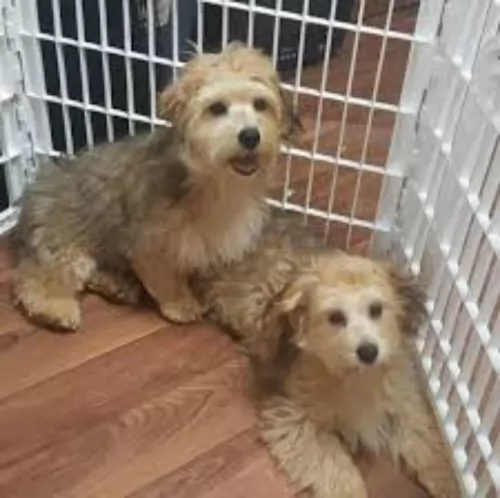 Everybody is busy and they don’t always have time to exercise their pets. As a human being, your health relies heavily on the exercise you get so you and your dog can exercise together.
Everybody is busy and they don’t always have time to exercise their pets. As a human being, your health relies heavily on the exercise you get so you and your dog can exercise together.
These days if you seriously don’t have time and you have money to spare, there are excellent doggy daycare centers where your dog can have fun playtimes with other dogs and people.
Dog exercises will change over time with age but at least try to get used to giving your pet a walk every day as this kind of exercise can extend into old age with both you and your pet.
Swimming, ball games, fetch games and walks or hikes are all great forms of exercise.
Good nutrition ensures your Yorkie Bichon has a good chance to be healthy and energetic. Some of the commercially manufactured dog foods you get are made with bad ingredients and they can make your dog sick.
The good quality ones can be nutritious for your dog and also wonderfully convenient. Always read the packaging labels so you know what your dog’s getting.
Cooked vegetables, boiled chicken and brown rice, nicely chopped up and added to the dry kibble can add variety to your pet’s diet while remaining deliciously nutritious and tasty as well.
Brush your Yo-Chon at least twice a week to keep the hair silky and shiny. Clip your dog’s nails when they get long.
Check inside his ears for signs of redness and the possibility of an infection. Try and look inside his mouth too for bad teeth as this can cause lots of health problems for your pet.
If you don’t have the time to do all these things, there are professional pet groomers who will do all these grooming chores for you.